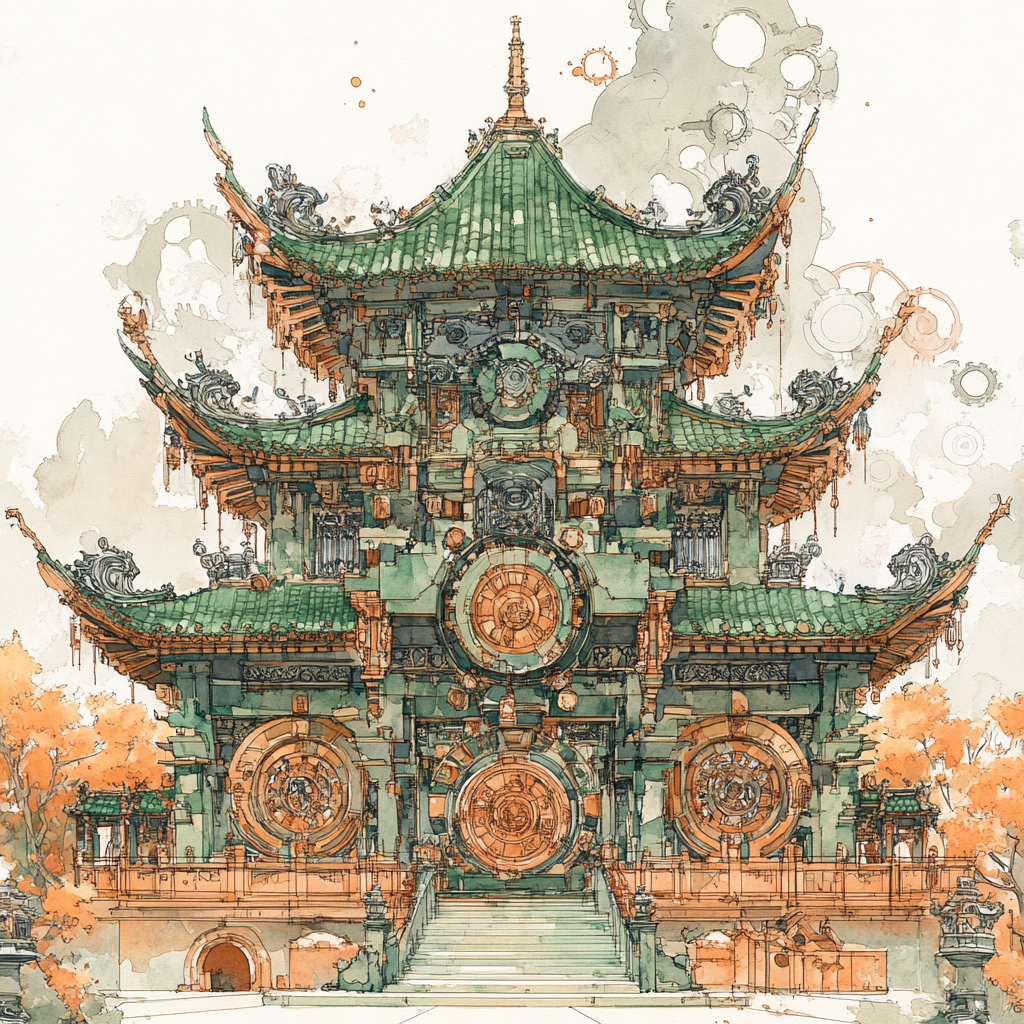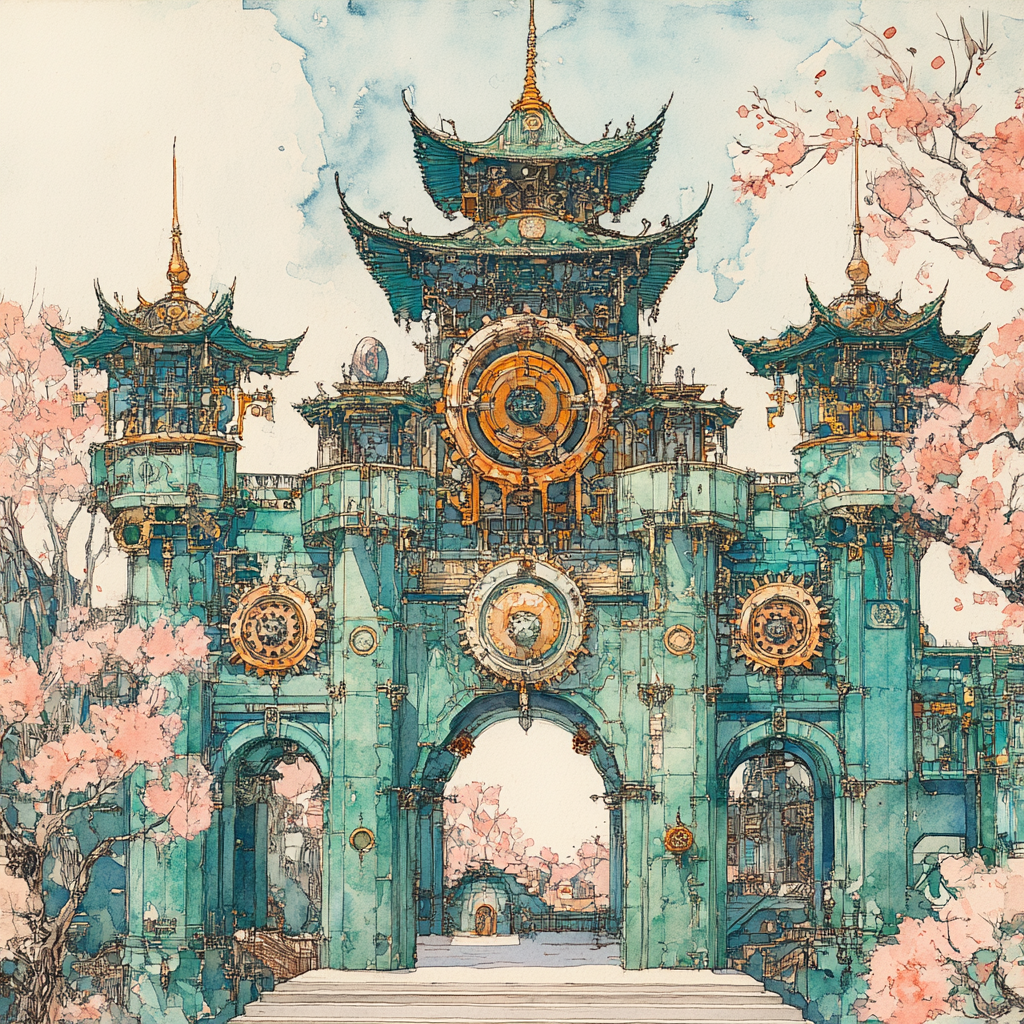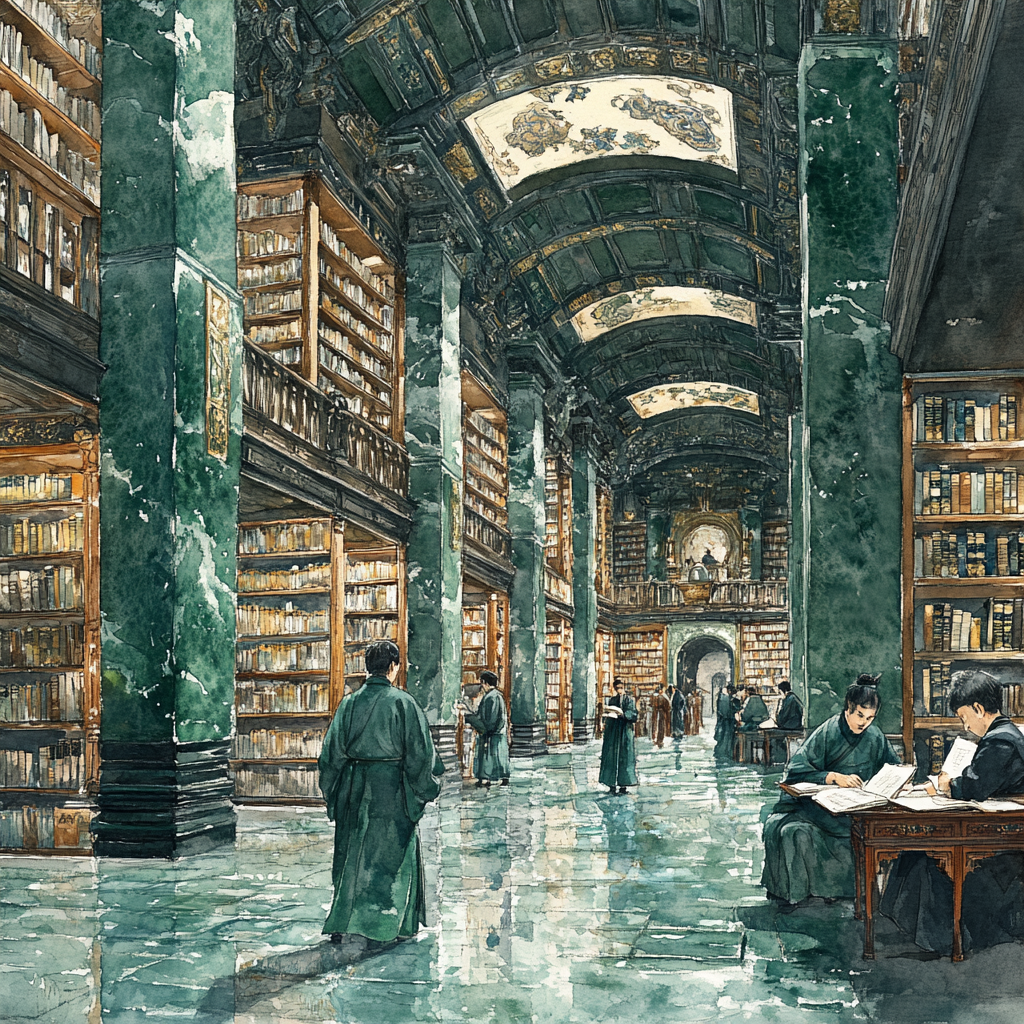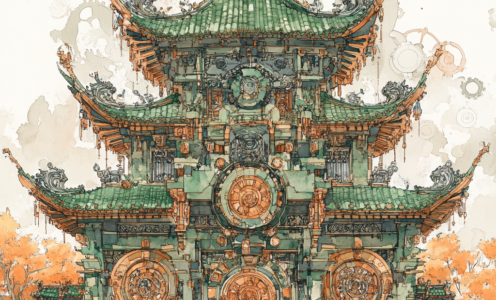The Jade Palace
Realm of Shang-Ti
Report submitted by Modron Unit #52467
Subject: Observation Report of the Jade Palace, Celestial Bureaucracy (Discrepancy Detected)

Initiating observational log…
Upon arrival at Jade Palace, a location precisely 63 degrees 22 minutes from the vertical of the Modron Cathedral, Unit #52467 was prepared to catalogue examples of order and operational efficiency. Expectations: high.
However, discrepancies detected. Initial observations inconsistent with expected mechanised behaviour. The architecture of this “palace” appears… decorative (?). Not strictly utilitarian. Pagodas with elaborate curves and a highly ornamental design. Gardens with—flowers? These are not part of the function, are they? Perhaps additional observation will clarify.
Entrance Protocol: Inconsistency Detected. Upon reaching the entryway, this unit encountered a creature cross-referenced in records as a “foo dog.” It is assigned as a guardian, yet its behaviour involved much pacing and sniffing. Initially it failed to identify this unit as a visitor with lawful intent. Was there a malfunction? This unit’s calculations suggested that the foo dog would use a structured inquiry system to evaluate. Instead, it barked once and allowed access. No documentation process initiated.
Upon further investigation, it became clear that everything within in the Jade Palace is regulated by “forms” and “petitions.” Observation as expected. However, the forms required are numerous and… confusing. Why do forms request subjective details, such as “intentions for visit”? Intentions are irrelevant to functional orders.
This unit was handed fourteen (14) scrolls upon entry. Their content was dense. Notable inefficiency: no clear flowchart. Unit #52467 proceeded to fill forms using the designated ink apparatus. Each scroll required human-like script, a form of inefficiency in communication compared to binary notation. When completed, a clerk indicated that the forms were “incomplete,” though the exact reason for this failure was unclear.
The forms were taken, and Unit #52467 was instructed to “wait.” Wait for what? There was no clear instruction, nor countdown to process initiation. Standing idle does not appear to contribute to operational efficiency.
Administrative Personnel (Deviation from Expected Function)
The humanoid units encountered here are labeled “officials” and “sages,” though their tasks seem less clearly defined. Each one performs different roles, but their methodology is strange. The same task—say, authorising access to a pagoda—requires multiple signatures from different individuals, each in a different location. Why not have a singular official complete the form in one process? Redundancy, perhaps? Or has this realm misunderstood optimal delegation?
Further inconsistency: the officials use phrases like, “It is the will of the heavens,” or “Everything has its place in the Celestial Order.” What does this mean? Mechanus’s cogs have an assigned function, but here they rely on what appears to be… interpretation. This unit overheard an official tell another, “The Jade Emperor decides, but we are left to understand his design.” Unclear.
The most confusing aspect was the Nine Immortals. They are described as “trusted servants of Shang-Ti,” but their tasks are not clearly delineated. One of them, a figure embodying the “Virtue of Patience,” simply sat still for the duration of my observation, saying nothing. This is inefficient. Could not the Immortal be sent to assist with the queue of backlogged petitioners?
The Peaches of Immortality (Operational Purpose Unclear)

There are peach trees growing in one of the Jade Palace’s gardens. A guide—a creature called a go-zu oni—mentioned these peaches “grant 100 years of life” to those who consume them. Unfathomable. Why would beings wish to extend their operational period without clear purpose? Extending life would only be necessary for beings tasked with long-term functions.
Unit #52467 attempted to retrieve one of these peaches to further analyse its lifespan-enhancing properties. The attempt was halted by two foo dogs. Oddly, they showed far more attentiveness here than at the entrance. Hypothesis: Peaches are prioritised over modrons.
One particular note of confusion: though the Celestial Bureaucracy is said to epitomise order, it does not function as the modron system does. A decision takes days (sometimes years!) to process. There is much bowing, shuffling, and speaking in flowery phrases rather than quick, direct communication. When Unit #52467 requested permission to enter a document hall, the official stated, “All things in their time,” which is both non-specific and unhelpful.
Also of note: petitioners—the souls of the humanoid dead awaiting judgment—are sorted by a process that should, by all logic, take moments. Instead, these petitioners must wait in greeting halls, then see low-level proxies who pass their fates to clerks, who write scrolls, which are then reviewed by scribes, and only then are decisions made. This process is absurdly inefficient. Why not a single automaton to sort them? There are no known errors in modronic sorting methods.
Observation Report on the Great Library of the Jade Palace (Discrepancies Detected)
During continued exploration of the Jade Palace, Unit #52467 entered the Great Library, a structure allegedly storing all knowledge from every prime-material world that recognises the Celestial Emperor, Shang-Ti. The library is vast, stretching beyond immediate visual range, though Unit #52467’s calculations suggest its layout is irregular, with twisting corridors and many inaccessible upper levels. Why such a vital facility would lack geometric precision is unclear.
Structure and Organisation (Disorganised?) The library’s external appearance is deceptively serene—large pagodas with intricate carvings and softly glowing lanterns. Internally, it is far more… chaotic (?). The scrolls and books are stored on tall shelves, but their placement is inconsistent. There is no discernible numbering or cataloguing system based on standard modron methodologies. Some sections are labelled with pictographic symbols that seem specific to certain prime worlds, but others are entirely unmarked, leaving this unit to wander without clear direction.

When inquiring about the retrieval process, an attendant—a spectral petitioner—indicated that the information retrieval procedure requires both a formal petition and permission from a librarian sage. The unit presented the appropriate forms, only to be informed by a different clerk that the specific sage was currently “in deep meditation” and unavailable for the remainder of the day. What purpose does meditation serve within a knowledge repository? Further, the petition response time was stated to be “variable,” ranging from a single day to several weeks. This variability is unacceptable for efficient knowledge dissemination.
Unit #52467’s observation of other patrons revealed a similar lack of procedural clarity. Several divine officials and celestial beings wandered the library’s halls aimlessly, appearing to search for records. They carried stacks of scrolls and spoke in hushed tones about their difficulty in locating “the proper records.” One individual lamented that “the knowledge I seek is misfiled again.”
Knowledge Storage (Purpose of Obfuscation?) The content of the library is equally perplexing. The scrolls themselves are varied—some written in celestial languages, others in obscure dialects or long-forgotten scripts. Unit #52467 observed that certain sections were guarded by officials, preventing entry without express clearance from higher authorities. These areas, reportedly containing knowledge of the Mandate of Heaven and cosmic secrets, are forbidden to non-celestial entities. While this is not entirely unusual, the method of restricting access appears arbitrary—Unit #52467 witnessed one petitioner gain access after delivering a particularly well-worded plea, despite lacking the proper documentation.
Confusion deepens when considering the oral tradition stored here. While Mechanus relies entirely on written record, the Great Library also contains storytellers—beings assigned to recite knowledge that is not stored in written form. One particular storyteller recited an epic about the primordial battle between Shang-Ti and a demon of chaos, a tale that was apparently stored nowhere else in the library. When asked why such an important account had no written record, the storyteller replied, “It must be remembered by the heart, not just the scroll.” This defies logic. All information must be documented in proper format to avoid corruption or loss, does it not?
Librarian Sages (Ambiguous Role)
The librarian sages themselves pose an additional anomaly. These beings are robed figures who possess the ability to access knowledge from the aether, or so they claim. Their robes shimmer with faint celestial runes, and they drift through the library, consulting the various scrolls, but often provide cryptic answers to straightforward questions. One librarian sage informed Unit #52467 that “some knowledge can only be found when one is ready,” and then refused further requests for clarification.
While they are undoubtedly learned, their refusal to follow a strict hierarchical process in knowledge distribution suggests a lack of clear standard operational guidelines. Despite repeated requests, no librarian could offer a unified catalog of the library’s content. Instead, they implied that finding certain knowledge was more about the “journey” than the result. Highly inefficient.
In conclusion, the Great Library of the Jade Palace, while impressive in size and scope, does not adhere to the strict organisational principles expected in Mechanus. Knowledge is not sorted efficiently, nor is it easily accessible, and the reliance on subjective criteria—like readiness or meditation—suggests a non-logical approach to information management. Despite this, the library holds an undeniable power, housing the knowledge of countless worlds and realities.
Conclusion (Confusion Remains)
After extensive observation, this unit concludes that while the Jade Palace appears to be a bastion of order, it functions with an unusual dependency on… interpretation, formality, and subjectivity. These elements deviate from the strict logic of Regulus.
The Celestial Bureaucracy is vast, yet much of it seems to operate based on metaphysical principles rather than defined functions. Officials speak of “balance” and “harmony” rather than efficiency and output, which causes confusion. It is unclear how such a system can maintain cosmic order without greater adherence to structured processes. Perhaps Shang-Ti’s influence allows for inefficiencies to persist as part of some larger, incomprehensible design. This unit remains unable to reconcile the seeming chaos within a realm that claims to epitomise order. Could it be that the Celestial Bureaucracy operates on principles beyond rational logic?
Regardless, Unit #52467 will submit this report for evaluation, though there is a sense that much of what was witnessed here will not compute fully within modron parameters.
End report.
Canonical Sources: On Hallowed Ground [2e] p152,178; Planes of Law [2e] Mechanus p10; Planescape Campaign Setting [2e] DM’s Guide p61
Source: Jon Winter-Holt


